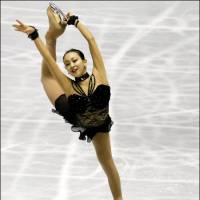Mao Asada's recent proclamation at the World Team Trophy that she "intends" to retire after next year's Sochi Olympics took many by surprise, but I think the proclamation is far from set in stone.
These were the words of an athlete who was completely exhausted after another long season and has been competing nonstop for nearly a decade. It is understandable that after so many years in the sport, the two-time world champion would be contemplating getting out, but a closer examination of the issues shows that it may not be so easy.
First off, consider that Mao is practically a walking conglomerate. She has so many sponsors that one can hardly go a day without seeing her face on television, in the trains, newspapers or magazines. Whenever she skates, the TV ratings are exponentially higher than normal.
Since bursting on the international scene as a precocious 15-year-old with her victory in the 2005 Grand Prix Final, Mao has nearly single-handedly carried the entire skating industry in Japan. While the comparison may not be precise, the impact Tiger Woods has had on golf could be equated with what Mao has done for her sport in this country.
Shizuka Arakawa's gold medal at the Turin Olympics a couple of months after Mao's GP Final win certainly raised interest in skating here, but informed fans can tell you that Mao beat Arakawa in three separate competitions that season.
Mao's popularity and pure image have been a constant since she first took the spotlight. She regularly tops the list of favorite female athletes and has exhibited incredible staying power over the years.
When taking all of the aforementioned into account, in addition to convincing herself that retiring is the right move, Mao will also have to persuade her sponsors, representatives, the media and fans.
This is where it gets complicated. By quitting skating, Mao would no doubt be impacted financially as her value to sponsors will drop significantly if she is not competing. She would certainly not lack for opportunities going forward, but one has to wonder if they would approach the level they are currently at.
Michael Jordan retired and returned to the NBA twice. He did it because of his love for the sport first, but the reality was also that when he was not playing, fewer people bought the shoes he endorsed.
Even greater influence will likely be exerted upon Mao by the Japan Skating Federation, as the business end of her retirement would no doubt hit it hard financially. If Mao bows out, there will be a huge void left behind.
With 2010 world champion Daisuke Takahashi and the popular Akiko Suzuki both signaling their intentions to retire after the Sochi Games, the JSF's problem becomes even more pronounced if Mao bids farewell.
Takahashi, at 27, and Suzuki, at 28, have extended their careers longer than most, so it is to be expected that they would bring the curtain down sometime soon.
But Mao will only be 23 when next season ends, which means she could considerably skate several more years, including all the way to the 2018 Pyeongchang Olympics, before hanging it up. With her physique and technique, Mao could easily compete for five more years.
Italy's Carolina Kostner earned the silver medal at last month's world championships, ahead of Mao, at 26. So it is feasible that Mao could be a strong contender for years to come.
Mao's agent, IMG's Mariko Wada, did not respond to a request for comment about her prized client's retirement talk.
Several other prominent people in the skating community did the same when I inquired. This is a perfect example of the power that Mao possesses. Many are fearful of even being perceived as saying anything negative about her.
Does Mao deserve the right to walk away from skating after everything she has accomplished?
Absolutely.
Has her impact on skating been profound?
Of course.
Is her legacy secure without an Olympic gold medal?
Certainly.
The reality is that Mao is an inspiration to a lot of people. Young and old, she has touched many and the wishes of her fans will no doubt weigh heavily on her ultimate decision.
The feeling here is that she would be better served by taking a year off — like Vancouver Olympic champion Kim Yu Na did — to recharge her batteries before making such a huge choice. Perhaps some time away will let her gain some perspective.
Anyone who has lived in this country for any length of time will know that a young athlete is often subjected to intense stress by various forces. Inevitably, it is the forces that get their way, especially if money is involved.
A recent case in point is Hokkaido Nippon Ham Fighters rookie Shohei Otani.
After loudly pronouncing last year that he would bypass Nippon Pro Baseball to go straight to the major leagues, Otani was "persuaded" by several parties that it would be in his best interests to start his career in Japan and think about the MLB later.
Otani, who was all of 18 at the time, was subjected to relentless pressure by the Fighters, his family and others, before "changing" his mind. It was the proverbial Japanese example of the nail that stands out being pounded down.
Just like Otani, Mao is a commodity who means money for many people and companies. Folks have a tendency to be quite particular when it comes to investments and their performance.
You better believe that Mao will face a mountain of pressure if she tries to retire after next season. Only time will tell if she can fight it all off and do what she really wants.



















With your current subscription plan you can comment on stories. However, before writing your first comment, please create a display name in the Profile section of your subscriber account page.